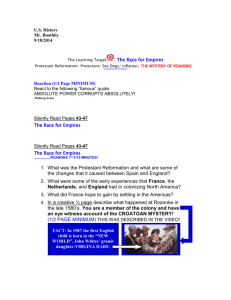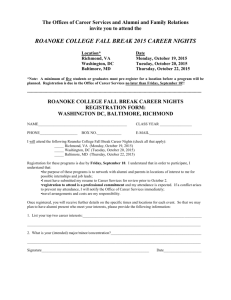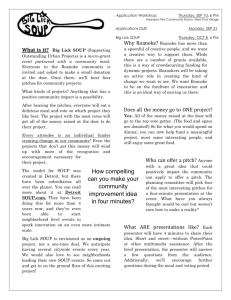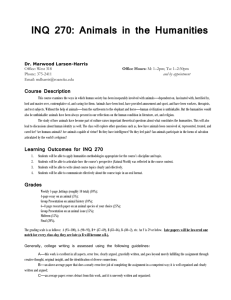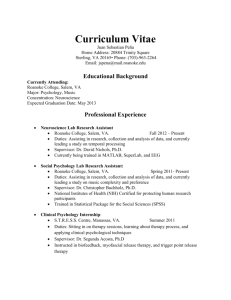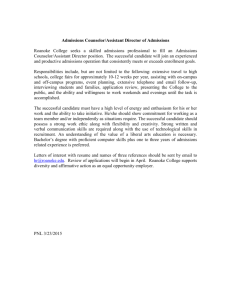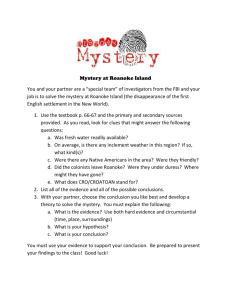GUIDELINES FOR SYLLABI
advertisement
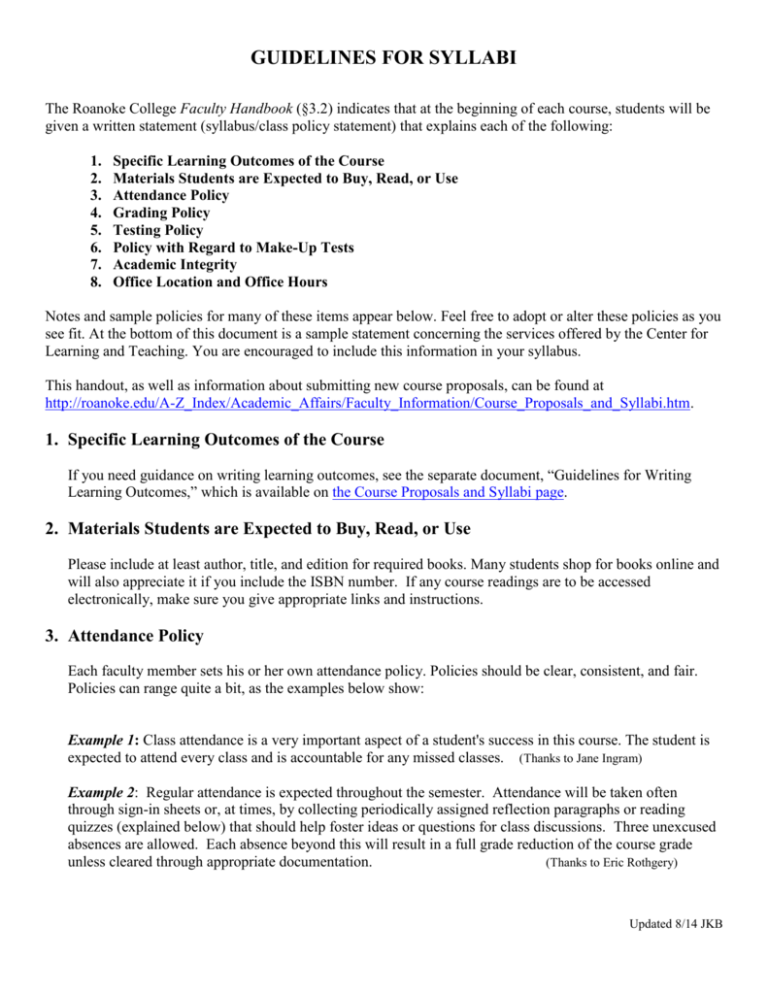
GUIDELINES FOR SYLLABI The Roanoke College Faculty Handbook (§3.2) indicates that at the beginning of each course, students will be given a written statement (syllabus/class policy statement) that explains each of the following: 1. 2. 3. 4. 5. 6. 7. 8. Specific Learning Outcomes of the Course Materials Students are Expected to Buy, Read, or Use Attendance Policy Grading Policy Testing Policy Policy with Regard to Make-Up Tests Academic Integrity Office Location and Office Hours Notes and sample policies for many of these items appear below. Feel free to adopt or alter these policies as you see fit. At the bottom of this document is a sample statement concerning the services offered by the Center for Learning and Teaching. You are encouraged to include this information in your syllabus. This handout, as well as information about submitting new course proposals, can be found at http://roanoke.edu/A-Z_Index/Academic_Affairs/Faculty_Information/Course_Proposals_and_Syllabi.htm. 1. Specific Learning Outcomes of the Course If you need guidance on writing learning outcomes, see the separate document, “Guidelines for Writing Learning Outcomes,” which is available on the Course Proposals and Syllabi page. 2. Materials Students are Expected to Buy, Read, or Use Please include at least author, title, and edition for required books. Many students shop for books online and will also appreciate it if you include the ISBN number. If any course readings are to be accessed electronically, make sure you give appropriate links and instructions. 3. Attendance Policy Each faculty member sets his or her own attendance policy. Policies should be clear, consistent, and fair. Policies can range quite a bit, as the examples below show: Example 1: Class attendance is a very important aspect of a student's success in this course. The student is expected to attend every class and is accountable for any missed classes. (Thanks to Jane Ingram) Example 2: Regular attendance is expected throughout the semester. Attendance will be taken often through sign-in sheets or, at times, by collecting periodically assigned reflection paragraphs or reading quizzes (explained below) that should help foster ideas or questions for class discussions. Three unexcused absences are allowed. Each absence beyond this will result in a full grade reduction of the course grade unless cleared through appropriate documentation. (Thanks to Eric Rothgery) Updated 8/14 JKB Example 3: Attendance will be taken at the beginning of every class meeting. If you arrive late it is your responsibility to make sure you are not marked absent in my grade book. Your fourth and each additional absence will result in a 2 point reduction in your final course grade. Please do not contact me with excuses about absences. You get three freebies so that I don’t have to distinguish between excused and unexcused absences. College athletes will be afforded wiggle room; please come see me immediately if you are an athlete. If you should have an emergency that requires you to miss a large chunk of the course, please notify me ASAP. (Thanks to Mary Henold) IMPORTANT NOTE: If you intend to drop students from a course in the event of excessive absences or missed requirements, you must spell out the specific details of your policy, and you must follow the drop policy requirements—especially concerning written warnings—as given in the Faculty Handbook §3.3.4. Please note that many students are not fully aware of the difference between dropping a course and being dropped. When a student is dropped from a course by an instructor, the instructor must indicate whether the student should receive a DP or a DF. A DP does not affect a student’s GPA. However, a DF carries zero quality points (just like an F) and does negatively influence a student’s GPA. Please consider alerting students to this reality in your policy statement. Also consider explaining on what basis you will assign a DP or a DF. 4. Grading Policy This would normally include how various course requirements are weighted and what grading scale will be used. Note that there is no standard grading scale at Roanoke College. Courses approved by the faculty ordinarily require final examinations. INQ 110, 120, and 300 do not require a final examination. Check with your department chair to see what departmental courses (often upper-level seminars) do not require final exams. Special arrangements to substitute some other form of evaluation for all other courses must be approved by the department chair. Your syllabus should mention the final exam and its weight in the overall course grade. Final examinations are scheduled at the times designated by the Registrar's Office. Special arrangements to schedule the final examination at a different time must be approved by the department chair and by the Registrar. 5. Testing Policy These requirements were penned in the early 80s. The intent of this requirement was probably for faculty to include information on the number of tests, papers, projects and the basic format of each. 6. Policy with Regard to Make-Up Tests Your syllabus should also include your policy on late submission of work (if allowed, within what time frame, and with what penalty). 7. Academic Integrity Every syllabus must include a statement describing how the college’s academic integrity policy (see www.roanoke.edu/academicintegrity) applies to the class. Many professors make a general statement that Updated 8/14 JKB indicates the importance of academic honesty and the requirement of knowing and following the policy in our brochure. In addition, you are encouraged to include the following topics, as appropriate: A. Plagiarism: If there are graded writing assignments, addressing plagiarism and how to avoid it is essential. It is also a good idea to discuss plagiarism during class or provide a separate handout about proper citation and references. B. Collaboration: Whether or under what conditions collaboration among students is permitted—for any graded assignment—should be clarified. These restrictions are sometimes difficult for students to understand. Consider taking the time to explain to students why you might allow collaboration for some class activities, but not for others. You may find the Guidelines for Students and Tutors to be helpful in this regard. C. Electronic Devices: An increasing number of professors are including a statement about electronic devices. You may wish to address whether any electronic devices may be used in class, in preparing assignments, or during tests. You might consider adopting a policy of requiring all students to deposit their phones in a basket prior to any quizzes or tests. Example 1: Students are expected to adhere to the policies in the "Academic Integrity at Roanoke College" Handbook. In particular, all tests, exams, quizzes, programming assignments, and papers are to be the work of the individual student. You are encouraged to get help from the instructor if you need help with an assignment. The work you turn in must be your own. Using someone else's work or ideas as your own is plagiarism and an academic integrity offense. Examples of academic integrity violations include copying a program or part of a program (even one line) from someone else, writing code for someone else, telling someone else how to solve a problem (such as telling someone the formula needed in a program) or having someone tell you how to solve a problem. Discussion among students should be limited to general concepts, not specific aspects of how to complete the assignment. (Thanks to Jane Ingram) Example 2: Your work is your own. You must not share it with anyone else nor should you borrow someone’s work and claim it as your own. If you copy (in whole or in part) someone else’s work (and here the ‘someone else’ could range from another student to the statistical matching algorithm behind Google Translate), that constitutes a violation of the Academic Integrity Policy. I would like for you to be willing and able to discuss outside of class the material that you are learning this semester. There is a difference, however, between telling someone the answer and showing them how to find it or generate it on their own. Therefore, all discussions about coursework should be limited to general concepts, not specific instructions of what to write, say, or do to complete an assignment. I encourage collaborative work in the classroom. In a language class, we will be working on many, many pairs and group activities in class. During these activities I encourage you to help, fine-tune, and learn from each other’s contributions. However, you are expected to individually complete all written and/or recorded graded assignments and to turn in work that is wholly your own. Telling a lie in an academic situation is a violation of Academic Integrity. For example, if you were to lie about why you missed a test or why an assignment was late, that constitutes a violation of Academic Integrity. Violations of the integrity standards will not be tolerated and will be reported without exception. Updated 8/14 JKB Lastly, it is important to understand that it is our responsibility as engaged and free-thinking members of a learning community to take stewardship of the values a liberal arts education promotes. The Academic Integrity Policy affords each of us the opportunity to do this in a way that protects the contributions of each community member. This is why we care about it and this is why we expect that our students, professors, and administrators uphold it both in spirit and in practice. (Thanks to Giuliana Chapman) Example 3: I subscribe to the academic integrity policies as outlined in Academic Integrity at Roanoke College. Students are expected to be familiar with these policies. As in real life, failure to learn the rules is not an excuse. Please contact me if you have any questions. Be aware that I am contractually obligated to report students if I suspect that they have engaged in academic dishonesty. During in-class activities, it is fine – and even encouraged -- to discuss and learn from one another. However, unless specifically stated otherwise, you are expected to individually complete all steps of the activity and to turn in your own work. All written assignments (unless specifically stated otherwise) are to be completed individually. Misrepresentation of your contribution to a group effort will be considered a violation of the academic integrity policy. Copying and pasting directly from a web site and claiming it as your own work is the same as copying and pasting directly from a book – both are violations of the academic integrity policy and will be treated accordingly. (Thanks to Kathy O’Neill) Example 4: Students are expected to follow the integrity policy detailed in the handbook Academic Integrity at Roanoke College. Additionally, if you are ever uncertain as to how the College’s policy pertains to any assignment or exam in this course, please ask me for clarification. The bottom line is that all work that a student submits for a grade must be solely the work of that student unless the instructor has given explicit permission for students to work together. (Thanks to Gary Hollis) Example 5: As members of a learning community, we enjoy important intellectual freedoms and are answerable to equally important academic responsibilities. Doing our own work and properly acknowledging the work of others are bedrock values in a community of scholars. When you arrived at Roanoke College you pledged to uphold these values and to abide by the practices and policies described in the brochure “Academic Integrity at Roanoke College.” It is your responsibility to read this brochure carefully and to understand it well. In a course such as this one, which involves independent scholarship and writing, it is especially important to cite and discuss your sources as a part of our intellectual exchange. And, as a matter of honesty, it is imperative that you understand what plagiarism is and avoid even unintended violations. Review carefully the section on plagiarism in the academic integrity brochure. If you have any questions, speak with me or bring up your questions in class. Finally, here is our policy regarding electronic devices: Cell phones and pagers must be turned off prior to entering the classroom. Laptops may be used for note-taking during regular class sessions, if this seems useful to you, but you may not log on to the internet or to an email server unless specifically told to do so. The use of laptops or any other electronic device during an exam is strictly prohibited. Any use of such devices during a quiz or exam will be considered a breach of academic integrity. (Thanks to Bob Schultz) Updated 8/14 JKB 8. Office Location and Office Hours Now that we’re in the 21st century, you will also want to include your e-mail address and any other avenues of electronic communication you wish to encourage. Services Offered by the Goode-Pasfield Center for Learning and Teaching Below is information about the services offered by the Goode-Pasfield Center for Learning and Teaching (located in Fintel Library). You may wish to draw students’ attention to these resources in your syllabi by using these sample statements. The Writing Center @ Roanoke College, located on the Lower Level of Fintel Library, offers writing tutorials focused on written and oral communication for students working on writing assignments/projects in any field. Writers at all levels of competence may visit the Writing Center at any point in their process, from brainstorming to drafting to editing, to talk with trained peer tutors in informal, one-on-one sessions. The Writing Center is open Sunday through Thursday from 4 to 9 pm. Simply stop in, or schedule an appointment by going to www.roanoke.edu/writingcenter, where our schedule of writing workshops and creative writing playshops is also posted. Questions? Email writingcenter@roanoke.edu or call 375-4949. Like our Facebook page for updates! Subject Tutoring is a CRLA Nationally Certified Program located on the lower-level of Fintel library in room 005. Subject Tutoring offers individual appointments in 30-minute intervals for Lab Sciences, Modern Languages, Math & CPSC, Social Sciences, and Business & Economics. Hours are Sunday - Thursday 4 p.m. 9 p.m. For a list of tutorials or to make an appointment, go to www.roanoke.edu/tutoring. The Office of Disability Support Services, located in the Goode-Pasfield Center for Learning and Teaching in Fintel Library, provides reasonable accommodations to students with identified disabilities. Reasonable accommodations are provided based on the diagnosed disability and the recommendations of the professional evaluator. In order to be considered for disability services, students must identify themselves to the Office of Disability Support Services. Students requesting accommodations are required to provide specific current documentation of their disabilities. Please contact Rick Robers, M.A., Coordinator of Disability Support Services, at 540-375-2247 or e-mail robers@roanoke.edu. If you are on record with the College’s Office of Disability Support Services as having academic or physical needs requiring accommodations, please schedule an appointment with Mr. Robers as soon as possible. You need to discuss your accommodations with him before they can be implemented. Also, please note that arrangements for extended time on exams, testing, and quizzes in a distraction-reduced environment must be made at least one week before every exam. Updated 8/14 JKB
